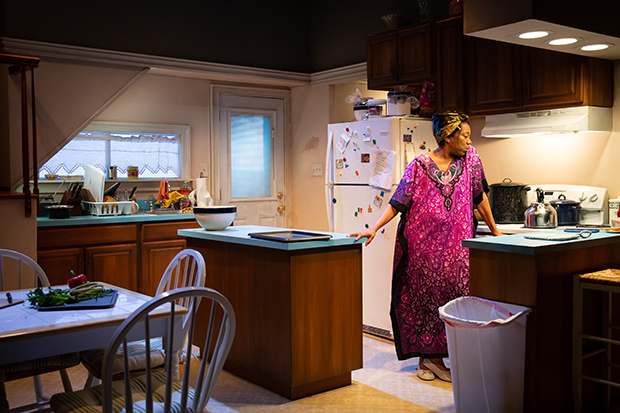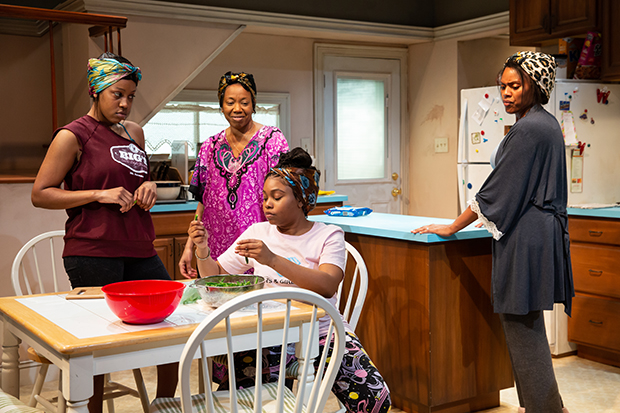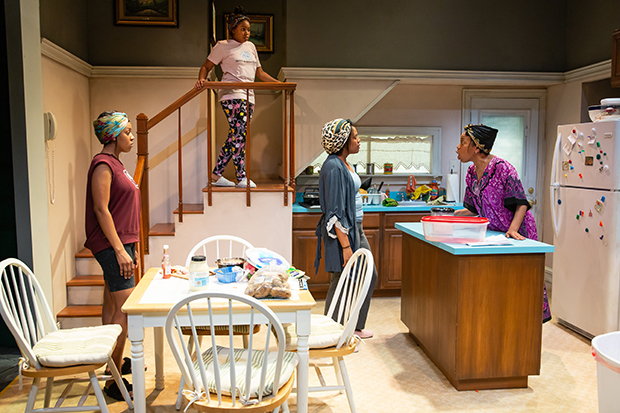For Black Women in America, it's Déjà Vu and Stew

(© Jeremy Daniel)
Have you ever had the feeling of déjà vu — that you've played out a scene before, like an actor on a stage? Mama has: She descends into the small kitchen of her Mt. Vernon, New York, home to make the same cup of tea with the same three lumps of sugar to the sound of that same yappy neighbor dog. She's in the middle of making the same stew she has made every year on this special day since "the beginning of time." And then there is the same old fear that causes her to jump at the sound of a loud pop coming from the street; maybe it's a punctured tire, or maybe it's something a lot worse.
Played with an enticing combination of the savory and the sweet by the fabulously single-named actor Portia, Mama is the matriarch of the Tucker family and one of four women in Zora Howard's Stew, now making its world premiere with Page 73 at Walkerspace. Howard takes the idea of perseverance to an extreme in this 90-minute comedy-drama about three generations of black women. The echoes stealthily reverberating throughout the script take on an air of creeping absurdity, which a lot of working-class black people might also feel about living in America.

(© Jeremy Daniel)
The story takes place the morning of an annual feast that Mama has planned for at least 50 people (the occasion it commemorates is never explicitly revealed, but audience members will likely leave with ideas). She is joined in the kitchen by her eldest daughter, Lillian (Nikkole Salter); her youngest, Nelly (Toni Lachelle Pollitt); and Lillian's preteen daughter, Lil' Mama (Kristin Dodson). Precocious and full of questions, Lil' Mama wonders why she is expected to help with the cooking while her brother is allowed to go play. Nearly 18 and ready to get out of Mt. Vernon, Nelly would much rather be playing with her boyfriend. Meanwhile, Lillian's husband is a no-show, a fact that sets Mama off on a rolling grumble.
"You know, I don't ask for much," she begins at a simmer. "I have one day. One day out of three hundred and sixty five that I ask everyone to show up. One day." Portia masterfully delivers these rants, which bubble and subside like a stew, only to come roaring back to life when some new ingredient is added to the pot. When Nelly complains that she is tired, Mama replies, "You know who else was tired? Jesus." Such lines earn hoots and snaps of recognition from black audience members, but Mama's ire will feel familiar to anyone who has ever toiled under the constant reproach of a tenacious matriarch. She reminded me of my Irish-German grandmother, who had a talent for stretching a grudge out like it was taffy, ensuring that everyone got a piece.
Director Colette Robert invites us all into the Tucker home with an intimate production. Lawrence E. Moten III's snug kitchen set depicts the thin line between coziness and claustrophobia. Stacey Derosier helps us feel the sweltering Mt. Vernon summer taking place just outside with natural lighting. Avi Amon's aggressive sound design brings us into the occasionally dizzy headspace of the women as they navigate the minefield of family history. My one disappointment with Robert's production is a lack of olfactory design. For a play so much about cooking and remembrance, Robert misses a grand opportunity to engage the sense most intensely tied to memory: smell.

(© Jeremy Daniel)
Still, Robert compensates with her rhythmic and resonant direction of the performances. She has craftily led the other three actors to a believable family resemblance. Like Mama, the younger women sport elaborate hairdos, kept under wraps like works of art before an unveiling (impressive hair and wig by Nikiya Mathis). We notice shared phrases and physical expressions, sometimes arriving simultaneously. We also see Mama's daughters making some of the same choices their mother made when she was their age. Will those decisions pan out better for them? Will Lil' Mama's recognition of that repeated history (especially when it comes to men) make her immune, or does her very name suggest her fate?
Howard gives us a lot to chew on when it comes to the cycles of history, and our own complicity in maintaining them. More disturbing are the choices history makes for us, over which we have no control (a theme that arrives with shocking brutality in this play). With humor and warmth, Stew challenges us to consider the life recipes that offer stability and comfort, and the ones that only taste like heartbreak.











